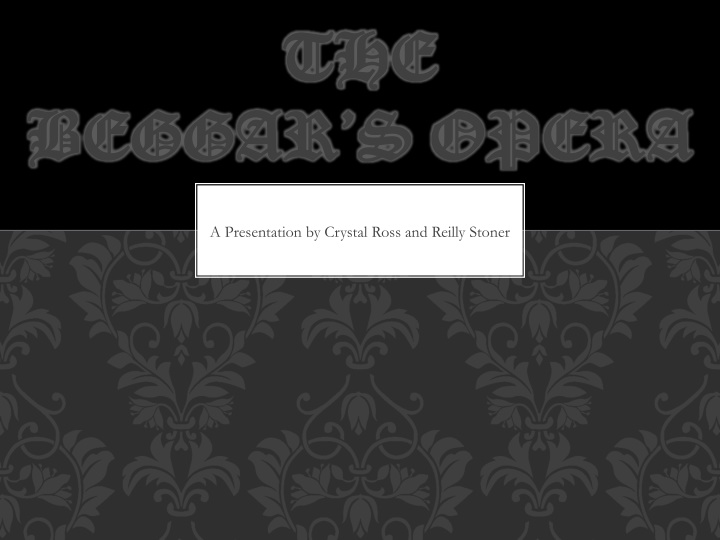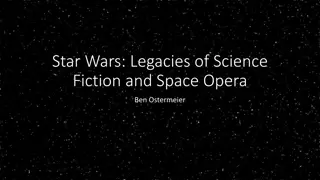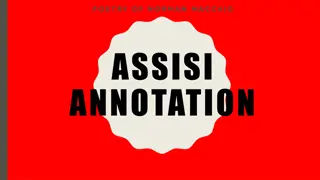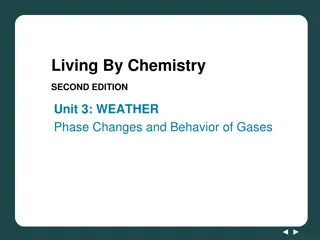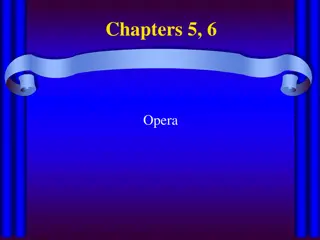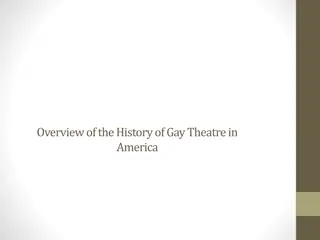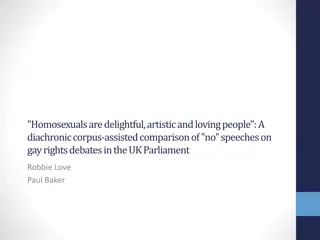Insights into John Gay's The Beggar's Opera
Explore the satirical brilliance of John Gay's The Beggar's Opera, a groundbreaking play that mocks Italian opera and social inequalities in 18th-century England. Through vivid characters and a captivating storyline set in London, Gay delves into themes of hypocrisy, corruption, and the blurred lines between classes. Discover the central conflict revolving around Peachum's quest to eliminate the notorious Macheath and the intertwining relationships that drive the narrative forward.
Download Presentation

Please find below an Image/Link to download the presentation.
The content on the website is provided AS IS for your information and personal use only. It may not be sold, licensed, or shared on other websites without obtaining consent from the author.If you encounter any issues during the download, it is possible that the publisher has removed the file from their server.
You are allowed to download the files provided on this website for personal or commercial use, subject to the condition that they are used lawfully. All files are the property of their respective owners.
The content on the website is provided AS IS for your information and personal use only. It may not be sold, licensed, or shared on other websites without obtaining consent from the author.
E N D
Presentation Transcript
THE THE BEGGAR S OPERA BEGGAR S OPERA A Presentation by Crystal Ross and Reilly Stoner
BASIC INFORMATION The Beggar s Opera was written by English playwright John Gay. It premiered on January 29, 1728 at the Lincoln s Inn Fields Theatre. It originally ran for 62 consecutive performances; it was the first play ever recorded to have a tenure that long. It served as the basis for Elisabeth Hauptmann and Bertolt Brecht s Die Dreigroschenoper (The Threepenny Opera). The premise of the play stemmed from a letter that Jonathan Swift (renowned satirist and author of Gulliver s Travels) sent to Alexander Pope (satirical poet known for his translations of Homer and Shakespeare). Gay originally intended for the songs to be sung a cappella; however, John Rich (the director of the Lincoln s Inn Fields Theatre) called for the addition of a score close to the opening of the show.
TITLE AND THEMES As evidenced by the title, The Beggar s Opera satirizes Italian opera and the upper class of England s obsession with it in the 18thcentury. The title also characterizes Gay s mockery of Italian opera by aligning it with commonplace English characters and music from everyday life (like church hymns and folk songs). By pairing the crooks and whores with the lofty aristocrats, Gay tackles the theme of social inequity and the natural hypocrisy of all men (regardless of class). Gay satirized politicians of his time (particularly the Whigs). The Beggar s Opera suggests that marriage isn t a selfless venture, but rather a lustful fulfillment of two (or more) people. Throughout The Beggar s Opera, Gay typifies the dishonesty and corruption of government officials and law enforcement.
SETTING The Beggar s Opera takes place in 18thcentury London, specifically around the area of Newgate Prison. At this time, there was a large economic shaft between the wealthy and the desolate. Italian opera was a fad amongst the English upper class at the time of its release; this is why John Gay chose to lampoon it. The significance of the play s setting is that, during the 18thand 19th century, London was plagued with gangs and other organized crime (think Oliver Twist). This allowed Gay to examine the corruption of both the criminal underground and the established government, as well as make connections between the two.
CENTRAL CONFLICT Peachum, an upper class crime affiliate, is enraged to discover that his daughter, Polly, has secretly married a notorious highwayman and gang leader by the name of Macheath. He and his wife decide that, in order to ensure financial security for their daughter and themselves, they must murder Macheath. The play splits focus between Macheath s two lovers, Polly and Lucy. However, all of the action revolves around Macheath; this makes him the protagonist of the play. The antagonist role is filled by both Peachum and his accomplice, Lockit. It is predominately Peachum who strives to bring down Macheath, so he would be considered the primary antagonist.
CHARACTERS Macheath He is a highwayman and leader of a London gang. Peachum He is an upper class crime affiliate that wants to kill his daughter s husband, Macheath. Polly She is the daughter of Peachum and the wife of Macheath. Lucy She is the daughter of Lockit and a mistress to Macheath. Lockit He is a corrupt jailer employed by Peachum.
BRIEF SUMMARY At the start of the play, Peachum and Mrs. Peachum both learn that their daughter, Polly, is married to the highwayman, Captain Macheath. They decide that if they were to kill Macheath, then all money would go to the widow. Scared, Polly warns Macheath and he fleas. He runs to a tavern where spies of Peachum throw him in the Newgate Prison. Macheath s former lover, Lucy, and daughter of the jailer, Lockit, confronts him. Since he has a better chance of being freed by her, he lies about his marriage to Polly. Lucy steals the keys and set him free. Macheath is captured once again and Lockit and Peachum demand to know who his wife really is. Four pregnant women then arrive and Macheath asks to be hanged. The audience demands a happy ending, so the beggar writes that Macheath declares his love for Polly and they sing and dance as the curtain closes.
QUOTES A lawyer is an honest employment, so is mine. Like me too he acts in a double capacity, both against rogues and for em; for tis but fitting that we should protect and encourage cheats, since we live by em. Peachum This quote portrays the morals and motivation that Peachum has throughout the play for wanting to kill Macheath: self interest and success lead to true morality. Suspect my honour, my courage, suspect any thing but my love. May my pistols miss fire, and my mare slip her shoulder while I am pursu d if I forsake thee! - Macheath This quote fools the audience into thinking that Macheath is as courageous and honorable as he says he is to Polly, when he turns out to be a coward in the next act and having very little loyalty.
UNUSUAL REFERENCES Newgate? - A former London prison whose unsanitary conditions became notorious in the 18th century before the building was burned down in 1780. Bob Booty? Robert Walpole (A british statesman who is generally regarded as the first prime Minister of Great Britain)
PERSONAL REACTION Crystal Ross While reading the play, I was very interested in the mocking style of Italian Opera that Gay portrayed. Not just in the writing, but in the character s personalities. Macheath, for example, was shown as the heroic male character in the beginning, yet turned out to be a deceitful coward. Also, how, in the end, they break the fourth wall and appease the audience by changing the ending to the model of a regular Italian Opera. Over all, I thought it was very enjoyable and entertaining.
PERSONAL REACTION Reilly Stoner To me, "The Beggar's Opera" is one of the most accurate portrayals of economic disparity in fiction, and it does so with a harmonious mix of colorful characters and satirical social commentary. John Gay does a terrific job of conveying a message while still giving each of his characters a distinct voice. Ultimately, The Beggar's Opera is a play worth its merit and an important milestone in the history of theatre.
